Unit 6 An old man tried to move the mountains Section A(3a-3c)课件(共38张PPT,含内嵌视频)人教版八年级下册
文档属性
| 名称 | Unit 6 An old man tried to move the mountains Section A(3a-3c)课件(共38张PPT,含内嵌视频)人教版八年级下册 |
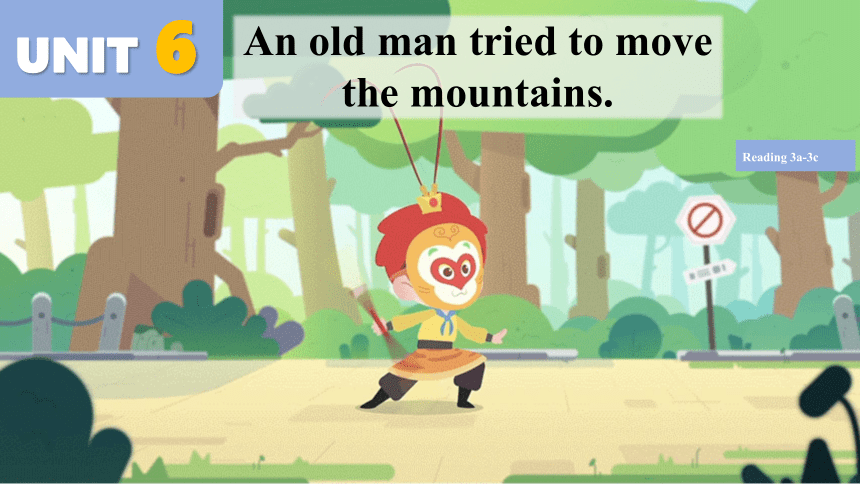
|
|
| 格式 | pptx | ||
| 文件大小 | 71.0MB | ||
| 资源类型 | 教案 | ||
| 版本资源 | 人教新目标(Go for it)版 | ||
| 科目 | 英语 | ||
| 更新时间 | 2025-05-31 13:45:49 | ||
图片预览

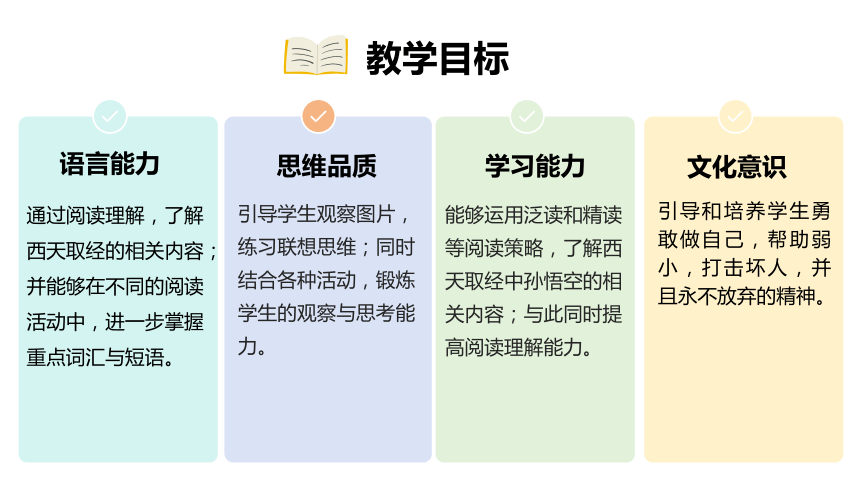
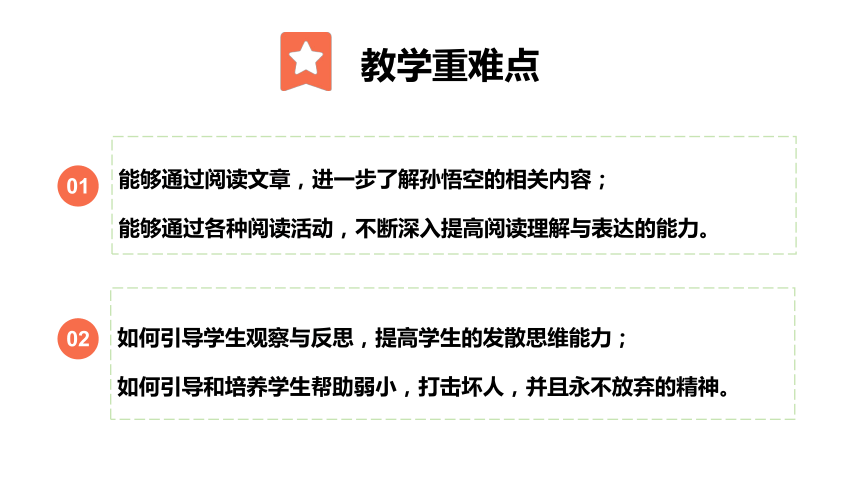
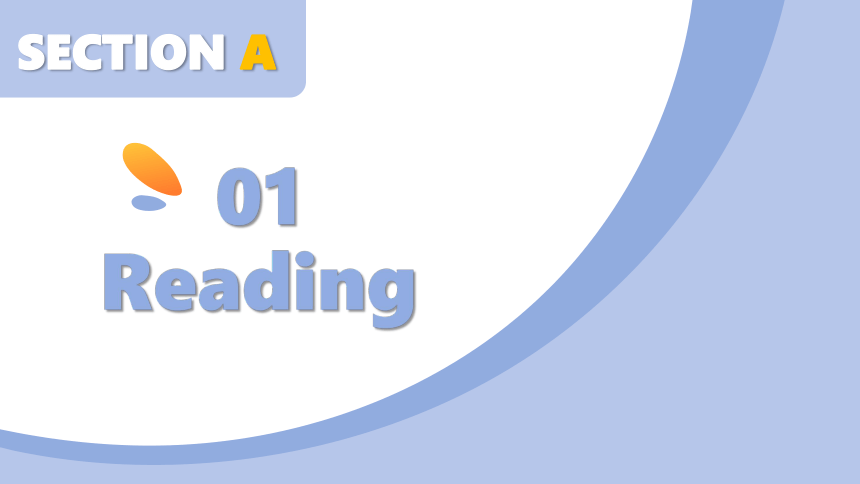
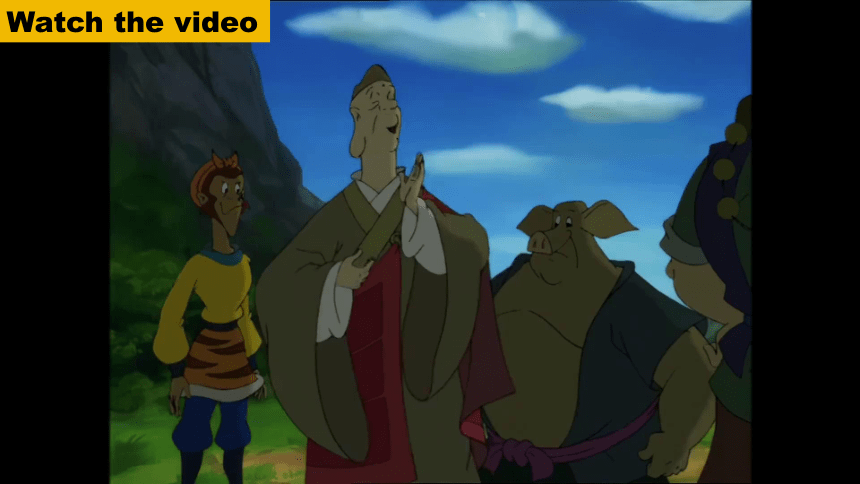
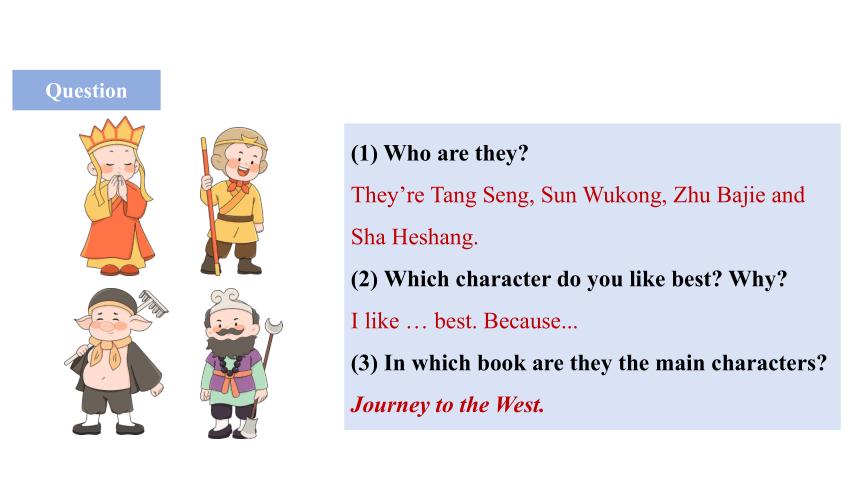
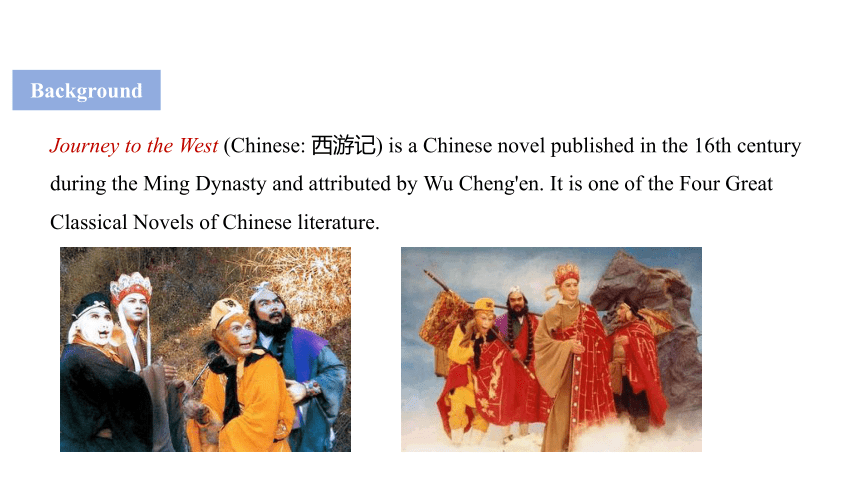
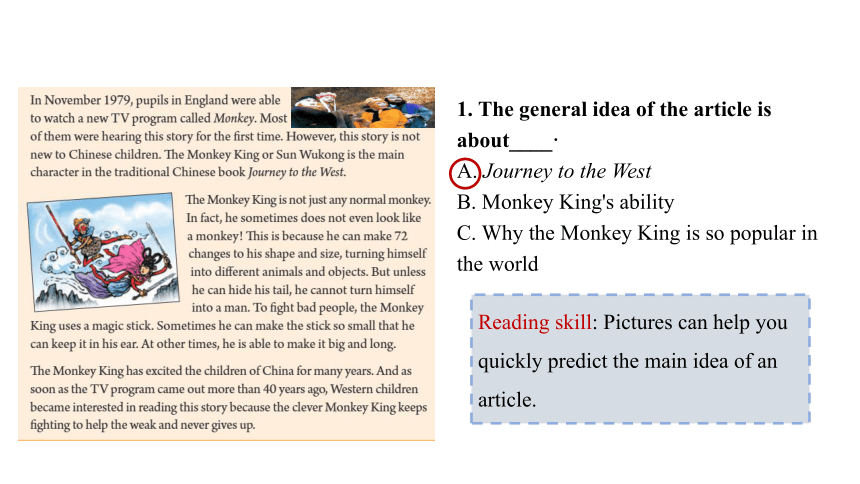
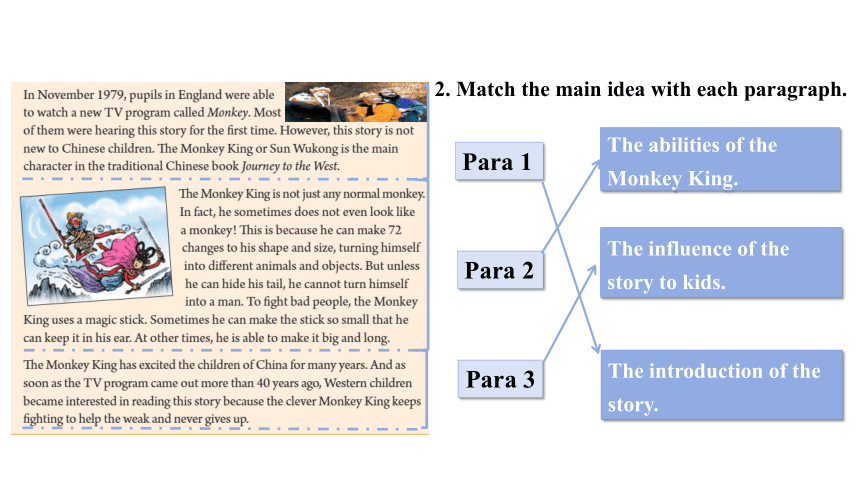
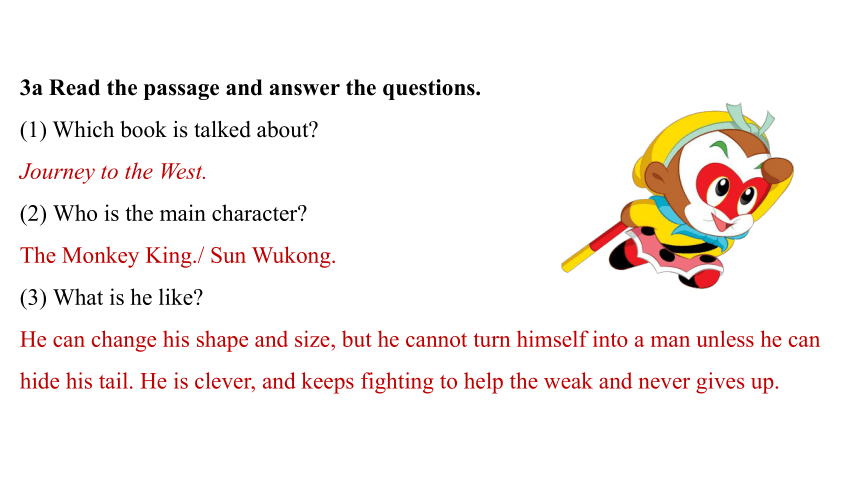
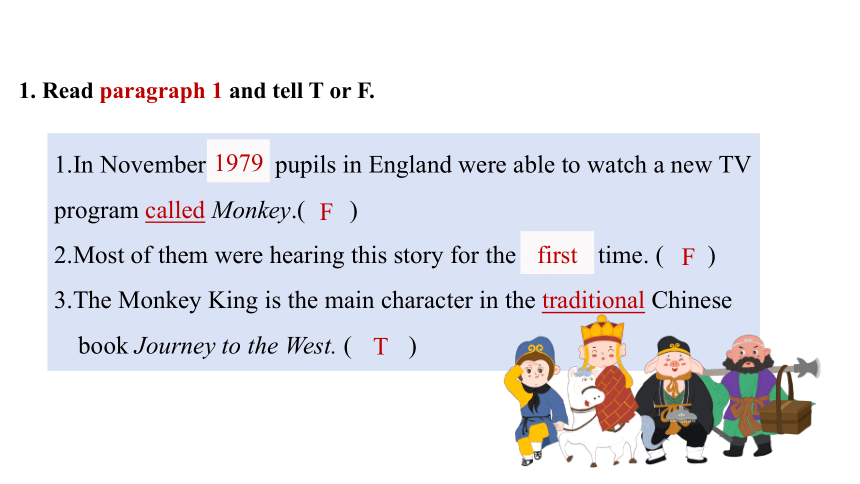
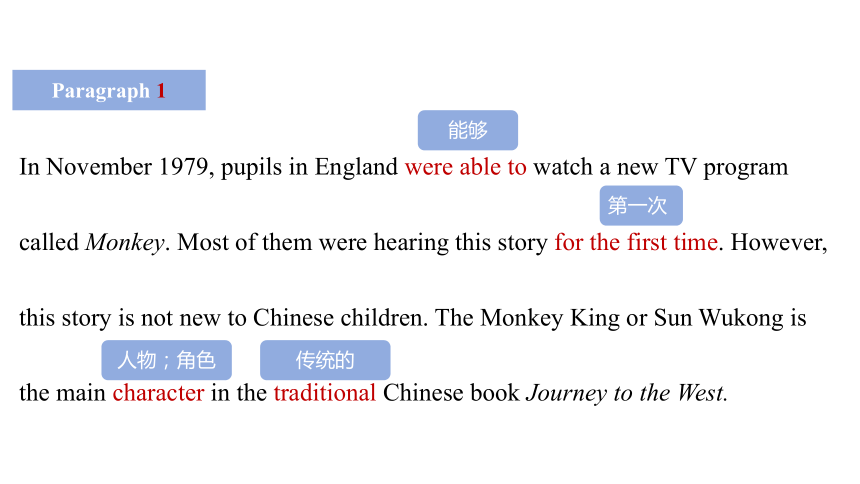
文档简介
(共38张PPT)
UNIT 6
An old man tried to move the mountains.
Reading 3a-3c
思维品质
学习能力
文化意识
语言能力
教学目标
通过阅读理解,了解西天取经的相关内容;并能够在不同的阅读活动中,进一步掌握重点词汇与短语。
能够运用泛读和精读等阅读策略,了解西天取经中孙悟空的相关内容;与此同时提高阅读理解能力。
引导和培养学生勇敢做自己,帮助弱小,打击坏人,并且永不放弃的精神。
引导学生观察图片,练习联想思维;同时结合各种活动,锻炼学生的观察与思考能力。
能够通过阅读文章,进一步了解孙悟空的相关内容;
能够通过各种阅读活动,不断深入提高阅读理解与表达的能力。
如何引导学生观察与反思,提高学生的发散思维能力;
如何引导和培养学生帮助弱小,打击坏人,并且永不放弃的精神。
01
02
教学重难点
01
Reading
SECTION A
Watch the video
1
(1) Who are they
They’re Tang Seng, Sun Wukong, Zhu Bajie and Sha Heshang.
(2) Which character do you like best Why
I like … best. Because...
(3) In which book are they the main characters
Journey to the West.
Lead-in
Question
2
Pre-reading
Journey to the West (Chinese: 西游记) is a Chinese novel published in the 16th century during the Ming Dynasty and attributed by Wu Cheng'en. It is one of the Four Great Classical Novels of Chinese literature.
Background
3
While-reading (Fast reading)
1. The general idea of the article is about____·
A. Journey to the West
B. Monkey King's ability
C. Why the Monkey King is so popular in the world
Reading skill: Pictures can help you quickly predict the main idea of an article.
3
The influence of the story to kids.
The introduction of the story.
Para 2
Para 3
The abilities of the Monkey King.
While-reading (Fast reading)
Para 1
2. Match the main idea with each paragraph.
3
While-reading (Fast reading)
3a Read the passage and answer the questions.
(1) Which book is talked about
Journey to the West.
(2) Who is the main character
The Monkey King./ Sun Wukong.
(3) What is he like
He can change his shape and size, but he cannot turn himself into a man unless he can hide his tail. He is clever, and keeps fighting to help the weak and never gives up.
3
While-reading (Careful reading)
1. Read paragraph 1 and tell T or F.
1.In November 1978, pupils in England were able to watch a new TV program called Monkey.( )
2.Most of them were hearing this story for the second time. ( )
3.The Monkey King is the main character in the traditional Chinese book Journey to the West. ( )
1979
first
F
F
T
Paragraph 1
In November 1979, pupils in England were able to watch a new TV program called Monkey. Most of them were hearing this story for the first time. However, this story is not new to Chinese children. The Monkey King or Sun Wukong is the main character in the traditional Chinese book Journey to the West.
能够
第一次
人物;角色
3
While-reading (Careful reading)
传统的
3
While-reading (Careful reading)
2. Read paragraph 2 carefully and answer the questions.
(1) Why isn't the Monkey King just any normal monkey
Because he can make 72 changes to his shape and size, turning himself into different animals and objects.
(2) What weapon does he use to fight bad people
A magic stick.
(3) What can’t he do
Unless he can hide his tail, he can’t turn himself
into a person.
3
While-reading (Fast reading)
3b Read the passage again and complete the chart about the Monkey King.
What he can do What he cannot do
(1) He can make 72 changes to his shape and size, turning himself into different animals and objects.
(2) He can make his magic stick so small that he can keep it in his ear, or make his magic stick big and long.
Unless he can hide his tail, he can’t turn himself into a person.
Paragraph 2
The Monkey King is not just any normal monkey. In fact, he sometimes does not even look like a monkey! This is because he can make 72 changes to his shape and size, turning himself into different animals and objects. But unless he can hide his tail, he cannot turn himself into a man. To fight bad people, the Monkey
King uses a magic stick. Sometimes he can make the stick so small that he can keep it in his ear. At other times, he is able to make it big and long.
看起来像;看上去与…… 相似;貌似
把…… 变成;使…… 成为
一根魔法棒;金箍棒
在其他时候
3
While-reading (Careful reading)
3
While-reading (Careful reading)
3. Read paragraph 3 and finish the mind map.
Western
Children
Chinese
Children
The Monkey ____ ______ the children of China for many years.
has
__ ____ __ the Monkey _____ ___ in 1979, Western children _______ _________ ___ ______ this story because the clever Monkey King _____ _______ to help ____ ______ and never gives up.
became interested in reading
came out
As soon as
keeps
the weak
fighting
excited
popularity and spirit
Paragraph 3
The Monkey King has excited the children of China for many years. And as soon as the TV program came out more than 40 years ago, Western children became interested in reading this story because the clever Monkey King keeps fighting to help the weak and never gives up.
出版;发行
对......感兴趣
放弃
3
While-reading (Careful reading)
the +adj 表示一类人
弱者;弱势群体;虚弱的人
继续做某事;持续做某事
3c Complete the sentences below with words and phrases from the passage.
1. Journey to the West is a ______________Chinese book. It tells one of the most popular stories in China.
2. When the English TV program Monkey ____________ in 1979, Western children ______________________this wonderful story.
3. The Monkey King can ____________________to his body. He is able to ____________________different animals and objects.
4. The Monkey King ______________make his magic stick small or large.
traditional
came out
became interested in
make 72 changes
turn himself into
is able to / can
4
Post-reading
Post-reading
4
Post-reading
A foreign friend Mary is very interested in Monkey King.
Can you tell her more about the character
1. Role play
Useful questions:
1. What is he like
2. What can he do
3. Can he do everything
4. Why ....
Mary: Monkey King really excites me
a lot. Can you tell me more
about him
You: Sure! ... is the ...
Mary: What can he do
You: He is able to/can...
Mary:What do you think of him
You: He is.......
4
Post-reading
2. Retell
Which character are you talking about
What is the main character like
Why has it excited so many people
Character
人物
Features
特征
Comments
评价
… is the main character in the book…
He can make….
He uses … to …bad people.
He can make his stick…or….
People are interested in… because he keeps fighting to …and never….
But he cannot turn …into....
4
Post-reading
3. Discussion
What spirit can we learn from Monkey King
clever
brave
keep fighting
never give up
help the weak
fight bad people
Language Points!
1. In November 1979, pupils in England were able to watch a TV program called Monkey. 1979 年 11 月,英国的小学生们能够收看一档名为《美猴王》的电视节目。
(1) be able to 能够,有能力。相当于情态动词can。后跟动词的原形。
例如: I can clean up the living room. Are you able to do the dishes
我可以打扫卧室,你能洗碗吗?
(2) called 叫做,命名。相当于named,在文中作TV program的后置定语。
例如:I don't know which is the boy called / named Tom.
我不知道哪个男孩叫汤姆。
Language Points!
2. This is because he can make 72 changes to his shape and size, turning himself into different animals and objects. 这是因为他能够对自己的外形和大小做出七十二般变化,将自己变成不同的动物和物体。
turn…into… 把…… 变成
例如:I have a dream that I've turned into an elephant. 我梦见自己变成了大象。
The witch tried to turn the prince into a frog.
那个女巫试图把王子变成一只青蛙。
With hard work, you can turn your dreams into reality.
通过努力,你可以把梦想变成现实。
Language Points!
3. But unless he can hide his tail, he cannot turn himself into a person.但是,除非他能藏起自己的尾巴,否则他无法把自己变成人。
(1) unless conj. 如果不;除非。引导条件状语从句, 相当于if…not。
例如:She won't forgive him unless he apologizes sincerely.
除非他真诚地道歉,否则她不会原谅他。
You won't pass the exam unless you study hard.
你不会通过考试,除非你努力学习。
if...not:更强调假设的情况,语气相对较委婉。
例如:You won't pass the exam if you don't study hard.
Language Points!
(2) hide v. 隐藏;隐蔽。(hide-hid-hidden)
例如:Where did you hide the money 你把钱藏哪里了?
I hid the broken plate behind the table. 我把打碎的盘子藏在餐桌后面了。
【短语拓展】
hide away:隐藏;躲避;把…… 藏起来
例如:He hid away in the attic for hours.他在阁楼上藏了好几个小时。
hide from:躲避;隐瞒
例如:She tried to hide her feelings from him.
她试图对他隐瞒自己的感情。
Language Points!
4. To fight bad people, the Monkey King uses a magic stick. 为了打败坏人,美猴王使用一根金箍棒。
magic adj. 有魔力的,有神奇力量的;迷人的,吸引人的
例如:All the people heard of the magic carpet. 所有人听说过魔毯的故事。
The magic carpet could fly.魔毯能飞。
The magician gave a magic performance that fascinated the audience.
魔术师进行了一场迷人的表演,吸引了观众。
magic trick:魔术表演,戏法。例如:The magician performed some amazing magic tricks.魔术师表演了一些令人惊叹的魔术。
Language Points!
5. Sometimes he can make the stick so small that he can keep it in his ear. 有时候,他能把金箍棒变得如此之小,以至于可以把它放进耳朵里。
stick作为名词,意为“棍;条;拐棍” 。
例如:He used a stick to beat the dog. 他用一根棍子打狗。
stick还可以作动词,表示“刺;插入;粘贴” 等意思。过去式、过去分词均为stuck。
例如:He stuck a nail in the wall. 他往墙上插入了一根钉子。
Be careful not to stick your finger with the needle.小心别让针戳到你的手指。
You should stick to your plan.你应该坚持你的计划。
Language Points!
6. Most of them were hearing this story for the first time. 他们大部分人都是第一次听说这个故事。
【most 与 most of 的区别】
(1) 若所修饰的名词前没有限定词,通常要用 most。
(2) 在习惯上不带冠词的专有名词(如人名和地名等)或抽象名词(如学科名词等)前,用most of。
(3) 若所修饰的名词前带有限定词,则用most of,不能只用most。
(4) 若直接用在代词之前,用most of。
Language Points!
例如:Most people agree with me. 多数人同意我的意见。
Most of the people here know each other. 这里大多数人互相认识。
Most of China has four distinct seasons.
中国大部分地区有四季分明的气候。
Most of Tom's spare time is occupied by volunteer work.
汤姆大部分业余时间都用于志愿工作。
Most of them have finished their homework.
他们中的大多数已经完成了作业。
Language Points!
7. And as soon as the TV program came out more than 40 years ago, ... 并且在 40 多年前这个电视节目一播出……
come out 推出;出版;发行
come out 其他常见的含义:
1).出来;出现 。2).开花;发芽。3).透露,传出;公之于世; (真相)大白
例如:The new book will come out next month.这本新书将于下个月出版。
The stars came out as soon as it was dark. 天一黑,星星就出来了。
Some flowers have begun to come out.有些花已经开始开放了。
The truth has come out at last.真相终于大白。
True courage lies in facing difficulties head - on and never giving up.
1. A neighbor ____________ (call) Tony, helped me repair my fence yesterday.
2. The Monkey King can make 72 ____________ (change) to his shape and size.
3. His uncle isn’t interested in _____________ (play) chess at all.
4. The two boys kept _____________ (skate) for one hour.
5. No one ___________ (be) able to answer him at that time.
Exercise-用正确形式填空
changes
called
playing
skating
was
1. They want to _________ the old houses into a hotel.
2. England lies to the _________ part of Europe.
3. She broke her _________ mirror into pieces.
4. Dogs wave their _________ when they're pleased.
5. Don't _________ behind the door. It's not safe.
Exercise-选择合适的词并用其适当形式填空。
magic, hide, tail, turn…into, western
turn
western
magic
tails
hide
02
Summary
SECTION A
03
Homework
SECTION A
Homework
1. Make sentences with these words.
be able to; make 72 changes, turn…into; so…that; come out; become interested in; keep doing sth.
2. Introduce this story to your parents.
SEE YOU NEXT CLASS!
UNIT 6
An old man tried to move the mountains.
Reading 3a-3c
思维品质
学习能力
文化意识
语言能力
教学目标
通过阅读理解,了解西天取经的相关内容;并能够在不同的阅读活动中,进一步掌握重点词汇与短语。
能够运用泛读和精读等阅读策略,了解西天取经中孙悟空的相关内容;与此同时提高阅读理解能力。
引导和培养学生勇敢做自己,帮助弱小,打击坏人,并且永不放弃的精神。
引导学生观察图片,练习联想思维;同时结合各种活动,锻炼学生的观察与思考能力。
能够通过阅读文章,进一步了解孙悟空的相关内容;
能够通过各种阅读活动,不断深入提高阅读理解与表达的能力。
如何引导学生观察与反思,提高学生的发散思维能力;
如何引导和培养学生帮助弱小,打击坏人,并且永不放弃的精神。
01
02
教学重难点
01
Reading
SECTION A
Watch the video
1
(1) Who are they
They’re Tang Seng, Sun Wukong, Zhu Bajie and Sha Heshang.
(2) Which character do you like best Why
I like … best. Because...
(3) In which book are they the main characters
Journey to the West.
Lead-in
Question
2
Pre-reading
Journey to the West (Chinese: 西游记) is a Chinese novel published in the 16th century during the Ming Dynasty and attributed by Wu Cheng'en. It is one of the Four Great Classical Novels of Chinese literature.
Background
3
While-reading (Fast reading)
1. The general idea of the article is about____·
A. Journey to the West
B. Monkey King's ability
C. Why the Monkey King is so popular in the world
Reading skill: Pictures can help you quickly predict the main idea of an article.
3
The influence of the story to kids.
The introduction of the story.
Para 2
Para 3
The abilities of the Monkey King.
While-reading (Fast reading)
Para 1
2. Match the main idea with each paragraph.
3
While-reading (Fast reading)
3a Read the passage and answer the questions.
(1) Which book is talked about
Journey to the West.
(2) Who is the main character
The Monkey King./ Sun Wukong.
(3) What is he like
He can change his shape and size, but he cannot turn himself into a man unless he can hide his tail. He is clever, and keeps fighting to help the weak and never gives up.
3
While-reading (Careful reading)
1. Read paragraph 1 and tell T or F.
1.In November 1978, pupils in England were able to watch a new TV program called Monkey.( )
2.Most of them were hearing this story for the second time. ( )
3.The Monkey King is the main character in the traditional Chinese book Journey to the West. ( )
1979
first
F
F
T
Paragraph 1
In November 1979, pupils in England were able to watch a new TV program called Monkey. Most of them were hearing this story for the first time. However, this story is not new to Chinese children. The Monkey King or Sun Wukong is the main character in the traditional Chinese book Journey to the West.
能够
第一次
人物;角色
3
While-reading (Careful reading)
传统的
3
While-reading (Careful reading)
2. Read paragraph 2 carefully and answer the questions.
(1) Why isn't the Monkey King just any normal monkey
Because he can make 72 changes to his shape and size, turning himself into different animals and objects.
(2) What weapon does he use to fight bad people
A magic stick.
(3) What can’t he do
Unless he can hide his tail, he can’t turn himself
into a person.
3
While-reading (Fast reading)
3b Read the passage again and complete the chart about the Monkey King.
What he can do What he cannot do
(1) He can make 72 changes to his shape and size, turning himself into different animals and objects.
(2) He can make his magic stick so small that he can keep it in his ear, or make his magic stick big and long.
Unless he can hide his tail, he can’t turn himself into a person.
Paragraph 2
The Monkey King is not just any normal monkey. In fact, he sometimes does not even look like a monkey! This is because he can make 72 changes to his shape and size, turning himself into different animals and objects. But unless he can hide his tail, he cannot turn himself into a man. To fight bad people, the Monkey
King uses a magic stick. Sometimes he can make the stick so small that he can keep it in his ear. At other times, he is able to make it big and long.
看起来像;看上去与…… 相似;貌似
把…… 变成;使…… 成为
一根魔法棒;金箍棒
在其他时候
3
While-reading (Careful reading)
3
While-reading (Careful reading)
3. Read paragraph 3 and finish the mind map.
Western
Children
Chinese
Children
The Monkey ____ ______ the children of China for many years.
has
__ ____ __ the Monkey _____ ___ in 1979, Western children _______ _________ ___ ______ this story because the clever Monkey King _____ _______ to help ____ ______ and never gives up.
became interested in reading
came out
As soon as
keeps
the weak
fighting
excited
popularity and spirit
Paragraph 3
The Monkey King has excited the children of China for many years. And as soon as the TV program came out more than 40 years ago, Western children became interested in reading this story because the clever Monkey King keeps fighting to help the weak and never gives up.
出版;发行
对......感兴趣
放弃
3
While-reading (Careful reading)
the +adj 表示一类人
弱者;弱势群体;虚弱的人
继续做某事;持续做某事
3c Complete the sentences below with words and phrases from the passage.
1. Journey to the West is a ______________Chinese book. It tells one of the most popular stories in China.
2. When the English TV program Monkey ____________ in 1979, Western children ______________________this wonderful story.
3. The Monkey King can ____________________to his body. He is able to ____________________different animals and objects.
4. The Monkey King ______________make his magic stick small or large.
traditional
came out
became interested in
make 72 changes
turn himself into
is able to / can
4
Post-reading
Post-reading
4
Post-reading
A foreign friend Mary is very interested in Monkey King.
Can you tell her more about the character
1. Role play
Useful questions:
1. What is he like
2. What can he do
3. Can he do everything
4. Why ....
Mary: Monkey King really excites me
a lot. Can you tell me more
about him
You: Sure! ... is the ...
Mary: What can he do
You: He is able to/can...
Mary:What do you think of him
You: He is.......
4
Post-reading
2. Retell
Which character are you talking about
What is the main character like
Why has it excited so many people
Character
人物
Features
特征
Comments
评价
… is the main character in the book…
He can make….
He uses … to …bad people.
He can make his stick…or….
People are interested in… because he keeps fighting to …and never….
But he cannot turn …into....
4
Post-reading
3. Discussion
What spirit can we learn from Monkey King
clever
brave
keep fighting
never give up
help the weak
fight bad people
Language Points!
1. In November 1979, pupils in England were able to watch a TV program called Monkey. 1979 年 11 月,英国的小学生们能够收看一档名为《美猴王》的电视节目。
(1) be able to 能够,有能力。相当于情态动词can。后跟动词的原形。
例如: I can clean up the living room. Are you able to do the dishes
我可以打扫卧室,你能洗碗吗?
(2) called 叫做,命名。相当于named,在文中作TV program的后置定语。
例如:I don't know which is the boy called / named Tom.
我不知道哪个男孩叫汤姆。
Language Points!
2. This is because he can make 72 changes to his shape and size, turning himself into different animals and objects. 这是因为他能够对自己的外形和大小做出七十二般变化,将自己变成不同的动物和物体。
turn…into… 把…… 变成
例如:I have a dream that I've turned into an elephant. 我梦见自己变成了大象。
The witch tried to turn the prince into a frog.
那个女巫试图把王子变成一只青蛙。
With hard work, you can turn your dreams into reality.
通过努力,你可以把梦想变成现实。
Language Points!
3. But unless he can hide his tail, he cannot turn himself into a person.但是,除非他能藏起自己的尾巴,否则他无法把自己变成人。
(1) unless conj. 如果不;除非。引导条件状语从句, 相当于if…not。
例如:She won't forgive him unless he apologizes sincerely.
除非他真诚地道歉,否则她不会原谅他。
You won't pass the exam unless you study hard.
你不会通过考试,除非你努力学习。
if...not:更强调假设的情况,语气相对较委婉。
例如:You won't pass the exam if you don't study hard.
Language Points!
(2) hide v. 隐藏;隐蔽。(hide-hid-hidden)
例如:Where did you hide the money 你把钱藏哪里了?
I hid the broken plate behind the table. 我把打碎的盘子藏在餐桌后面了。
【短语拓展】
hide away:隐藏;躲避;把…… 藏起来
例如:He hid away in the attic for hours.他在阁楼上藏了好几个小时。
hide from:躲避;隐瞒
例如:She tried to hide her feelings from him.
她试图对他隐瞒自己的感情。
Language Points!
4. To fight bad people, the Monkey King uses a magic stick. 为了打败坏人,美猴王使用一根金箍棒。
magic adj. 有魔力的,有神奇力量的;迷人的,吸引人的
例如:All the people heard of the magic carpet. 所有人听说过魔毯的故事。
The magic carpet could fly.魔毯能飞。
The magician gave a magic performance that fascinated the audience.
魔术师进行了一场迷人的表演,吸引了观众。
magic trick:魔术表演,戏法。例如:The magician performed some amazing magic tricks.魔术师表演了一些令人惊叹的魔术。
Language Points!
5. Sometimes he can make the stick so small that he can keep it in his ear. 有时候,他能把金箍棒变得如此之小,以至于可以把它放进耳朵里。
stick作为名词,意为“棍;条;拐棍” 。
例如:He used a stick to beat the dog. 他用一根棍子打狗。
stick还可以作动词,表示“刺;插入;粘贴” 等意思。过去式、过去分词均为stuck。
例如:He stuck a nail in the wall. 他往墙上插入了一根钉子。
Be careful not to stick your finger with the needle.小心别让针戳到你的手指。
You should stick to your plan.你应该坚持你的计划。
Language Points!
6. Most of them were hearing this story for the first time. 他们大部分人都是第一次听说这个故事。
【most 与 most of 的区别】
(1) 若所修饰的名词前没有限定词,通常要用 most。
(2) 在习惯上不带冠词的专有名词(如人名和地名等)或抽象名词(如学科名词等)前,用most of。
(3) 若所修饰的名词前带有限定词,则用most of,不能只用most。
(4) 若直接用在代词之前,用most of。
Language Points!
例如:Most people agree with me. 多数人同意我的意见。
Most of the people here know each other. 这里大多数人互相认识。
Most of China has four distinct seasons.
中国大部分地区有四季分明的气候。
Most of Tom's spare time is occupied by volunteer work.
汤姆大部分业余时间都用于志愿工作。
Most of them have finished their homework.
他们中的大多数已经完成了作业。
Language Points!
7. And as soon as the TV program came out more than 40 years ago, ... 并且在 40 多年前这个电视节目一播出……
come out 推出;出版;发行
come out 其他常见的含义:
1).出来;出现 。2).开花;发芽。3).透露,传出;公之于世; (真相)大白
例如:The new book will come out next month.这本新书将于下个月出版。
The stars came out as soon as it was dark. 天一黑,星星就出来了。
Some flowers have begun to come out.有些花已经开始开放了。
The truth has come out at last.真相终于大白。
True courage lies in facing difficulties head - on and never giving up.
1. A neighbor ____________ (call) Tony, helped me repair my fence yesterday.
2. The Monkey King can make 72 ____________ (change) to his shape and size.
3. His uncle isn’t interested in _____________ (play) chess at all.
4. The two boys kept _____________ (skate) for one hour.
5. No one ___________ (be) able to answer him at that time.
Exercise-用正确形式填空
changes
called
playing
skating
was
1. They want to _________ the old houses into a hotel.
2. England lies to the _________ part of Europe.
3. She broke her _________ mirror into pieces.
4. Dogs wave their _________ when they're pleased.
5. Don't _________ behind the door. It's not safe.
Exercise-选择合适的词并用其适当形式填空。
magic, hide, tail, turn…into, western
turn
western
magic
tails
hide
02
Summary
SECTION A
03
Homework
SECTION A
Homework
1. Make sentences with these words.
be able to; make 72 changes, turn…into; so…that; come out; become interested in; keep doing sth.
2. Introduce this story to your parents.
SEE YOU NEXT CLASS!
同课章节目录
- Unit 1 What's the matter?
- Section A
- Section B
- Unit 2 I'll help to clean up the city parks.
- Section A
- Section B
- Unit 3 Could you please clean your room?
- Section A
- Section B
- Unit 4 Why don't you talk to your parents?
- Section A
- Section B
- Unit 5 What were you doing when the rainstorm came
- Section A
- Section B
- Review of Units 1-5
- Unit 6 An old man tried to move the mountains.
- Section A
- Section B
- Unit 7 What's the highest mountain in the world?
- Section A
- Section B
- Unit 8 Have you read Treasure Island yet?
- Section A
- Section B
- Unit 9 Have you ever been to a museum?
- Section A
- Section B
- Unit 10 I've had this bike for three years.
- Section A
- Section B
